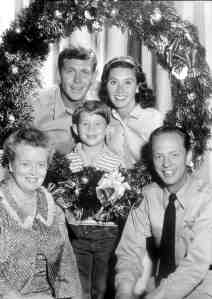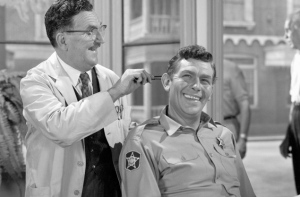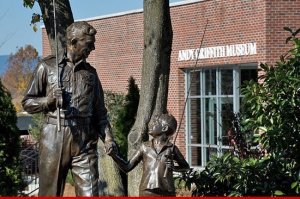
-One-
I normally do not get emotional about a movie icon.
But this Fourth of July, I can’t keep emotions totally out of my system. Because I’m writing about an icon who I thought was somebody I could remember for the rest of my life. This is someone who makes me happy every time I think about him and watch his shows. He gives me reasons to believe in sanity, moderation, common-sense life and human compassion. He gives me reasons to love and keep faith in love.
I am writing about Andy Griffith. I’m trying make a connection between him, Middle America and yes, the Fourth of July.
Of course, it’s not just about Andy Griffith as a person; rather, it’s about a way of life he iconized through mass media. This is a value system he established even deeper in American soil. That is critically important to remember today because today’s America and American media do not talk about the way of life Andy Griffith, his shows and his friends, colleagues and co-actors talked about. This America and this media today have made a 180 degree turn from the philosophies that his prime time shows in the sixties popularized: philosophies that took deep roots in Mid-America and its moderate, loving and caring, smiling, ordinary, working men, women and children.
They were the philosophies of non-violence, social togetherness, inclusion, equality, modern outlooks and a greed-free lifestyle. Those were the American values that made America an exemplary nation throughout the world. Those were the values that brought millions of immigrants like me to this country — with high hopes and optimism.
Andy Griffith, a small-town Southern sheriff named Andy Taylor, never carried a gun. But he carried those eternal American values we terribly miss now.
Those are the American values we want to remember on this Fourth of July.
-Two-
Of course, he is not the only one who preached and practiced and popularized sanity, society and peace on media and entertainment. Around the same time — in the sixties — icons such as Pete Seeger, Bob Dylan, Joan Baez, Paul Robeson or the Beatles were more or less doing the same in the Western world. It was a tumultuous time. The glorious civil rights movement on one hand and a few years later, the valiant mass resistance against the Vietnam war shook America to the core. Countless artists, poets, singers, filmmakers, actors and actresses joined in on the peace movement globally and the civil rights movement within America. Brutally violent rulers across the world and brutally repressive rulers across the U.S. were struggling to put down the civil disobedience tempest. American young generation was waking up to fresh air of new realities. They were embracing the concepts of peace, justice and equality. The Berlin Wall of color, race and religion was crumbling.

Pete Seeger, Bob Dylan, Joan Baez, Paul Robeson or the Beatles’ styles were, however, different from Andy Griffith’s. The simple sheriff in the Southern small-town of Mayberry did not join in on a civil rights protest march or gave a speech about the futility of war. He wasn’t even remotely interested about politics, although he had to run for elections every few years to keep his paid position as the sheriff. He also took sides on local mayoral candidates, and once opposed his own Aunt Bee who stood for mayor, causing serious domestic strife. But he was largely a non-political man: his job was to run the small town of Mayberry as smoothly as possible, with help from his laughably inefficient deputy and a group of awkward country simpletons (or even a town alcoholic he was rehabilitating).
Doing this, however, a widower with a small boy Opie, he wouldn’t have no lack of time to engage in several affairs (one affair at a time) with local belles, go fishing regularly with the son, organize and sing in the church choir, or occasionally visit for dinner Mount Pilot, the nearest big town seven miles away. Sheriff Andy Taylor refuses to leave his birthplace Mayberry even when an old-time, high-school sweetheart attempts to lure him away to Chicago. No he wouldn’t leave: he loves his relaxed lifestyle and rural lads and lasses.
-Three-
That is his real America. Here, a group of Italian farmer immigrants with no English-speaking skills gets a hostile bunch of “mainstream” Americans — to the point of being driven away. An innocent man for absolutely no valid reason is suddenly ostracized by the entire town because the people with their superstition think he is jinx. The old barber Floyd spreads rumors about anything and it catches on like wildfire. Local ruffians engaged in illegal trading threat the weakling deputy. Sinister outsiders stash drug money in the barber shop. A bank is going to get robbed by armed robbers faking a film shooting. A dangerously violent criminal jailbreaks and hides in Mayberry, stealing the deputy’s gun.

And in all instances, it falls on the shoulders of Sheriff Taylor to interfere, mitigate and resolve the issue. And he does it with the use of his head — a head of a genius strategist and game maker — with absolutely no intention to use his gun. I take it back: he never had a gun (not even at his North Carolina home). He always thought problems could be handled nonviolently if he’d acted with determination and had the support and confidence of the society. And he did enjoy the support and confidence of the society.
In fact, he had had a society and they all cared for one another.
Sadly, that sane and moderate America is taken away from us. Extreme inequality, war, violence, hate, bigotry and economic exploitation have pervaded this land once again.
-Four-
Sheriff Andy Taylor would never spare opportunities to sit down with his motherless child for his homework, sort out the small boy’s small but significant problems growing up, go fishing with him whistling away, talk to his school teacher Helen Crump who would later be his girlfriend, and attend church meetings and evening dinners religiously with Aunt Bee and son Opie, with frequent presence of childhood friend Deputy Bernie Fife who as a concerned family friend would also attempt to educate the boy, however inadequately. Andy would not miss an opportunity to play his guitar sitting out on the front porch, with Bee, Opie, Ms. Crump, Fife and sometimes Fife’s girlfriend Thelma Lou joining in. The country music would be slow and soothing, with soft and subtle strumming of the nylon guitar. The full moon would look down upon these simple, honest creatures; its soft and subtle silvery light would flood the Mid-American little town Mayberry — as if it had brought the divine blessings from the Almighty who is sending down his message of togetherness, love, compassion and peace.
Opie, Ron Howard, is now a big-time filmmaker; he is, I guess, my generation. A celebrity in his own right now, does he remember those soft, love-laced days from the sixties? I do. I wish I had an opportunity to go fishing with Sheriff Taylor. Only once…that’s all.
I wanted to play a small part in Andy Griffith’s message of love, social togetherness and nonviolence. I wanted to be a small part in the Grand-Ole American message of hope, togetherness and nonviolence.
Mr. Sheriff, I’m going to miss you. I’m going to miss the Middle American values you lived and died for.
This Fourth of July, I swear to God, Middle America is going to miss you too.
Sincerely Writing,
Partha
Brooklyn, New York
###
